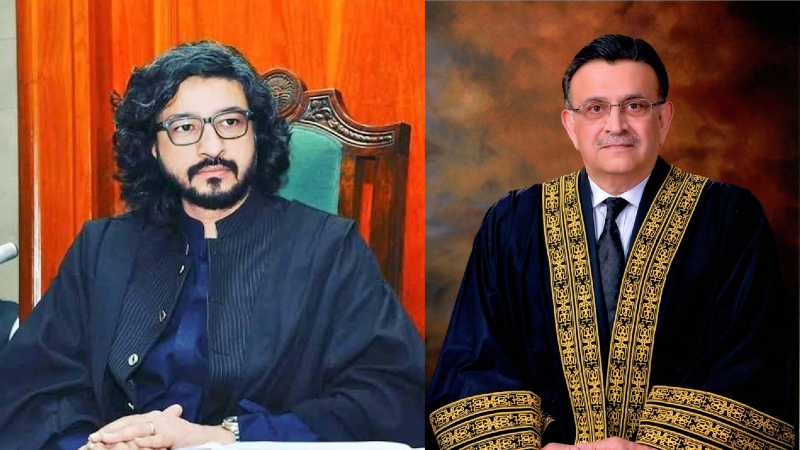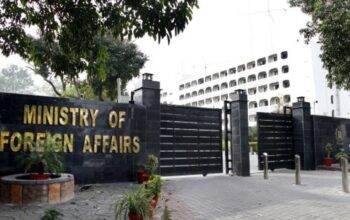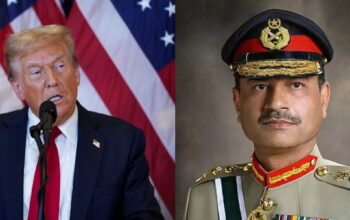All parties to the case have been issued notices for the next hearing in the case at 2:00 pm today.
By Naveed Naqvi
LAHORE: A three-member bench of the Supreme Court of Pakistan Saturday summoned Deputy Speaker Punjab Assembly Sardar Dost Mohammad Mazari in his personal capacity to explain his ruling rejecting the 10 votes of Pakistan Muslim League – Quaid-e-Azam (PML-Q) in a runoff election for the provincial chief minister.
A three-member SC bench headed by CJP Umar Ata Bandial is hearing a petition brought by PML-Q leader Chaudhry Pervez Elahi, the candidate who lost out the Friday’s runoff because of Mazari’s ruling. Besides the CJP, the bench includes Justice Ijaz ul Ahsan and Justice Munib Akhtar.
Earlier, the Lahore registry of the SCP opened in the small hours of the night to admit Elahi’s petition.
The Deputy Speaker relied on the SCP judgment in Reference No. 1 of 2022 and Constitution Petition No. 9 of 2022, in which the court interpreted Article 63-A of the Constitution of Pakistan.
In the ruling, the SC held that “if at all there is any conflict between the fundamental rights of the collectivity (i.e., the political party) and an individual member thereof it is the former that must prevail.”
The ruling took the view that “… the vote of any member (including a deemed member) of a Parliamentary Party in a House that is cast contrary to any direction issued by the latter in terms of para (b) of clause (1) of Article 63A cannot be counted and must be disregarded…”
Deputy Speaker Mazari relied on this judgement Friday to reject all 10 votes of PML-Q after they voted contrary to the instructions issued by their party chief Chaudhry Shujaat Hussain. He read to the house the letter issued by Hussain, expressly instructing his party’s members of the provincial assembly to vote Hamza Shehbaz.
But Justice Bandial said Saturday the SC ruling cited included nothing to warrant the Deputy Speaker’s rejection of PML-Q votes. He said Mazari should “come and explain our decision to us”.
“We always learn”, the CJP said. “Let the Deputy Speaker come and tell us in which paragraph we wrote what he has quoted.”
The Court also remarked that Hamza Shehbaz’s oath of office as elected chief minister does not count.
After hearing the arguments of Barrister Ali Zafar, court issued notices to all parties to the case, setting the next hearing for 2:00 pm today.
Interestingly, the apex court verdict Mazari relied on the majority opinion in the case – signed off by the same three judges comprising today’s bench. It held:
“Political parties are an integral aspect of the bedrock on which our democracy rests. Their destabilization tends to shake the bedrock, which can potentially put democracy itself in peril. Defections are one of the most pernicious ways in which political parties can be destabilized. Indeed they can delegitimize parliamentary democracy itself, which is an even more deleterious effect. Defections rightly stand condemned as a cancer afflicting the body politic. They cannot be countenanced.
“It follows that Article 63A must be interpreted in a purposive and robust manner, which accords with its spirit and intent. Ideally, the Article should not need to be invoked at all; its mere existence, a brooding presence, should be enough.
“Put differently, the true measure of its effectiveness is that no member of a Parliamentary Party ever has to be declared a defector. Article 63A should therefore be given that interpretation and application as accords with, and is aligned as closely as possible to, the ideal situation.
“The pith and substance of Article 63A is to enforce the fundamental right of political parties under Article 17 that, in particular in the legislative arena, their cohesion be respected, and protected from unconstitutional and unlawful assaults, encroachments and erosions.
“It must therefore be interpreted and applied in a broad manner, consistent with fundamental rights.”
The minority opinion in the case, penned by Justice Mazhar Alam Khan Miankhel and Justice Jamal Khan Mandokhail, differed with the majority opinion over defection, maintaining:
“Article 63A of the Constitution of Islamic Republic of Pakistan (the Constitution) is a complete code in itself, which provides a comprehensive procedure regarding defection of a member of the Parliament and consequences thereof.
“In case the Election Commission of Pakistan confirms the declaration sent by a Party Head against a member, he/she shall cease to be a Member of the House. As a result thereof, his/her seat shall become vacant. A right of appeal to this Court has also been provided under sub-Article (5) of Article 63A of the Constitution, to either of the party, aggrieved by the decision of the Election Commission.
“Any further interpretation of Article 63A of the Constitution, in our view, would amount to re-writing or reading into the Constitution and will also affect the other provisions of the Constitution, which has not even been asked by the President through this Reference.
“Therefore, it is not our mandate. We see no force in the questions asked through this Presidential Reference, which are answered in the negative. However, if the Parliament deems fit or appropriate may impose further bar or restrictions upon the defectors.”
Copyright © 2021 Independent Pakistan | All rights reserved




